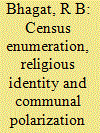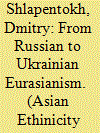|
|
|
Sort Order |
|
|
|
Items / Page
|
|
|
|
|
|
|
| Srl | Item |
| 1 |
ID:
122655


|
|
|
|
|
| Publication |
2013.
|
| Summary/Abstract |
Census is considered to be a scientific exercise. However, it leaves a deep impact on religious and ethnic identities. This is because through census enumeration not only are boundaries of communities fixed, but also actual size and growth are known. This adds a new sense to the identities of the religious communities in the sphere of democratic politics. In India, the census was started around 1872 during the British rule, seven decades after the first census was held in Great Britain in 1801. The question on religion was included right from the first Indian census, unlike the British census which only included it in 2001. This paper shows that the inclusion of the question on religion, and the consequent publication of data on size and growth of population by religion during British rule, invoked sharp communal reactions. The demographic issues found a core place in the communal discourse that continued in independent India. The paper argues that the demographic data on religion was one of the important factors that raised Hindu-Muslim consciousness and shaped the Hindu and Muslim relationship in both colonial and postcolonial India. As a result, several demographic myths have found a place in the communal discourse shaping the political imagination of India.
|
|
|
|
|
|
|
|
|
|
|
|
|
|
|
|
| 2 |
ID:
122656


|
|
|
|
|
| Publication |
2013.
|
| Summary/Abstract |
Eurasianism is a popular creed in post-Soviet Russia. Its supporters believe Russia is a unique blend of Slavic and non-Slavic, mostly Muslim Turkic people. With the rise of Russian nationalism, Muslims were transformed into enemies. It has been a different story in Ukraine, where Russians - 'the old brothers' - became an alien force and Turkic people an acceptable minority. This trend has held for the last 20 years regardless of all vacillations in Ukrainian political/cultural development.
|
|
|
|
|
|
|
|
|
|
|
|
|
|
|
|
| 3 |
ID:
122660


|
|
|
|
|
| Publication |
2013.
|
| Summary/Abstract |
Among the overseas Vietnamese around the world, many are Chinese Vietnamese. They fled from Vietnam for different political and economic reasons during the 1970s and the 1980s. Many of them have returned to Vietnam since the 1990s to work, invest or retire. What is interesting about these returned Chinese Vietnamese migrants is the fact that when they left Vietnam they were called by the Vietnamese the Hoa (, Chinese) or Hoa ki?u (, overseas Chinese) by the Vietnamese. This identity was actually one of the reasons for their escape. When they returned, they were lumped together with all other returnees into the category of Vi?t ki?u (, overseas Vietnamese) and enjoyed the special rights offered by the Vi?t ki?u policy of the Vietnamese government, which was aimed at boosting the national economy. Although their 'Chinese' identity had once made them to risk their lives by sailing out on the roaring sea, their 'Vietnamese' identity brought them back to Vietnam at other turning points in their lives. The shifting identity of these Hoa ki?u-turned-Vi?t ki?u has produced an interesting migration story and an intriguing category of 'hybrid diaspora.'
|
|
|
|
|
|
|
|
|
|
|
|
|
|
|
|
| 4 |
ID:
122654


|
|
|
|
|
| Publication |
2013.
|
| Summary/Abstract |
This paper traces changes in the culture of the Kyrgyz ethnic group in the era after the break-up of the USSR. In order to describe correctly changes in their lives, a comparison was used from a wide range of areas where Kyrgyz live. As a basis, the way of life of Kyrgyz in Kyrgyzstan is used. Kyrgyz here represent the majority, but before the break-up they did not emphasize their ethnicity significantly. After the break up of the USSR and the formation of the national state, they began to look for new, or new-and-old, roots and to strengthen their nationalistic tendencies. Looking for new roots included the creation of historical constructs and emphasizing many specifics of lifestyles of 'real Kyrgyz'. But Kyrgyz live in many other states as a minority - especially in China, Tajikistan and Afghanistan. These Kyrgyz, however, often designate different elements of their culture as a basis of their ethnic group compared to Kyrgyz from Kyrgyzstan. The paper first tries to identify important elements of Kyrgyz culture in the era of the break-up of the USSR based on statements of respondents from Kyrgyzstan and to find out if these elements are also important as an identification feature for Kyrgyz in other states. Field research has been conducted in China and Tajikistan, but in this work, results from Afghanistan in particular are presented. The paper also tries to give an answer as to the influence of the formation of the national state (Kyrgyzstan) on members of ethnic groups living in other states as a minority (Kyrgyz in Afghanistan) and how this changed their ethnic identity.
|
|
|
|
|
|
|
|
|
|
|
|
|
|
|
|
| 5 |
ID:
122659


|
|
|
|
|
| Publication |
2013.
|
| Summary/Abstract |
An increasing number of ethnic Chinese students born in Venezuela return to mainland China each year to study the language of their ancestors, Mandarin. This article examines how they expose themselves to multiple discourses of 'identity', develop a reflexive strategy to cope with a multi-layered identity and act out their identity in China. In order to do so three core topics - culture, language, and identity will be analyzed and elucidated. In today's world, different forms of mobility affect the negotiation of identity and belonging. Besides migration or the physical/corporeal mobility of people there are other forms of mobilities such as the mobility of commodities, the flows of information, ideas and beliefs, financial mobility as in the case of remittances, virtual travel through Internet. These mobilities intersect and affect different discourses of language, identity and culture. The identity and sense of belonging of this group will be elucidated in four interconnected realms of social life: (1) family, (2) school, (3) fashion and popular culture, (4) food practices.
|
|
|
|
|
|
|
|
|
|
|
|
|
|
|
|
| 6 |
ID:
122657


|
|
|
|
|
| Publication |
2013.
|
| Summary/Abstract |
Debates on secularism in Malaysia often revolve around the legal, especially the constitutional, framework. To this end several NGOs organised a road show in 2006 to debate issues surrounding freedom of religion. Not only were these events mobbed by angry crowds, but also the state intervened and shut down these and future discussions on the topic of religion, deeming such debates sensitive. This article addresses the particularities of secularism in Malaysia vis-à-vis Olivier Roy's thesis in 'Secularism Confronts Islam' that sees religious space and secular space as discernable yet not antithetical and Charles Taylor's thesis in the 'Secular Age', where he points to a new definition of secularism as a pluralist and transcendent notion of belief. In Malaysia both variants are present, with the state playing a dangerous game situating itself between reactionary Muslim forces and a moderate majority.
|
|
|
|
|
|
|
|
|
|
|
|
|
|
|
|
| 7 |
ID:
122658


|
|
|
|
|
| Publication |
2013.
|
| Summary/Abstract |
This article implemented geographic information system and spatial statistics to explore the settlement patterns of ethnic groups in Nan, Thailand, in relation to geographic factors. The general findings reveal that people of the same ethnic group tend to live in clustered fashion. In addition, ethnic groups located on an elevation of 200-500 m above the mean sea level tend to live near both roads and rivers (within 1 km), while those on higher elevations tend to live further away from roads and rivers. Furthermore, the unique characteristics of the settlement patterns of each ethnic group were also identified.
|
|
|
|
|
|
|
|
|
|
|
|
|
|
|
|
|
|
|
|
|